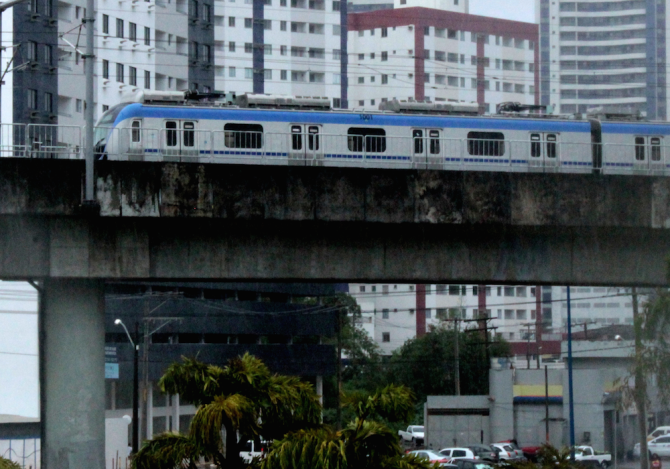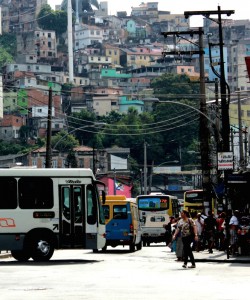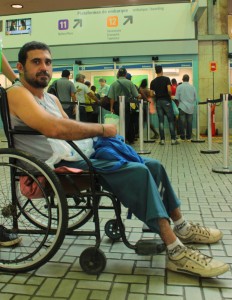
Above image: a
neglected train car on an unfinished subway system in the city of
Salvador. The state of Bahia has promised the system will be functional for the
2014 World Cup which begins later this week.
Soccer is still the national passion
in Brazil. However, as the country prepares to host the World Cup, the streets
are filled with flags supporting the national team. Rather, they are flooded
once again with protests. While the country invested large amounts of money
into the mega sporting event, critics say it did not do the same for the
nation’s mass transit infrastructure.

World Cup host cities such as Rio de
Janeiro and Salvador are seeing some of the most dramatic shortcomings.
Municipal governments in these cities promised a “Transport
Revolution.”In reality, rates were increased without improving services,
and the perception among transit riders is that the new infrastructure that was
completed was done so to cater to the needs of FIFA, the governing body of the
World Cup tournament, and a few private companies who monopolize contracts for
transport systems.
These factors triggered major
protests that began in
June 2013. In addition, transit workers are currently on strike across several
Brazilian cities in protest of low salaries and bad working conditions. A video
from Friday June 6th captures
a standoff between riot police and striking workers.
In Rio, four million trips are made daily
on public transport, according to the Municipal Office of Transport. Trains and
buses are the main commuting vehicles, but both systems have severe problems.
Clara Costa Pereira, a resident of Rio’s neighboring city Duque de Caxias, who
works as a maid in downtown Rio. It takes Clara and her husband about two hours
to get home, even though her route is only approximately 20 km. She says, “I
wait at least half an hour at the train station and face overcrowding every
day. I feel my rights are constantly being violated.”
 Mazio Neto, who uses a wheelchair,
Mazio Neto, who uses a wheelchair,
faces significant difficulties moving through Rio’s Central Station which is
always overcrowded. “I thought we would have improvements for disabled people.
But every day I get squeezed into the train,” he reports.
Licinio Rogerio Machado, a member of
Rio de Janeiro’s Forum for Urban Mobility dismisses small gains. “Local
government has made improvements, but without taking into consideration the
needs and concerns of the population,” he says.
The Rapid Bus Transit (BRT) system is
one such improvement. The BRT Transoeste route is already functional and
another route from Barra da Tijuca to Galeão Airport will be opened in time for
the World Cup.
Residents of the communities,
however, were not consulted. The “Dossier
on megaevents and human rights violations in Rio de Janeiro 2014 [PO],”
released by People’s Committee of the World Cup and Olympics last Friday
reports that while RS $6.2 billion (US $2.7 billion) was spent on urban
mobility, RS $1 billion (US $445.5 million) was spent on forcibly evicting
families to make space for the BRT.
This constitutes a violation of civil
rights, according to Juciano Rodrigues, a researcher from Metropolis
Observatory (IPPUR / UFRJ). “Urban mobility is being completely violated in
World Cup host cities. Yes, we can say that improvements were made, but at what
cost? The truth is services do not benefit areas most in need of assistance.
And evictions will affect a hundred thousand people just in Rio alone, some of
them because of transportation projects,” said Rodrigues.
According to Rodrigues, access to
transportation is an issue that will affect millions across Brazil. In
Salvador, the third most populous city in Brazil with 2.8 million inhabitants,
the city’s transportation systems are a significant hindrance to people’s
mobility. At major bus terminals like Mussurunga and Lapa, long waits,
overcrowding and signs of neglect such as leaks and ill lit walkways are
common. When asked about the mechanisms that allow for rider feedback, the City
Department of Transportation only answered they have telephone numbers to hear
residents’ opinions.
The subway system is something of a
punch line in Salvador. “This subway is an urban legend. When I was still in my
mother’s belly, 35 years ago, the plan had already been created. With the World
Cup, we thought, it’s finally going to happen now! But still, nothing,” said
Rebecca Almeida, who sells tapioca, a Bahian delicacy.
The state government announced that
the system would open in time for the World Cup. If it opens at all, the
initial segment of the system will not be longer than 6 km and will have cost
about $1 billion reais (approximately US $438.5 million).
With public transportation so
difficult and delayed, more people are buying cars, which in turn increases
congestion. Across the country, it takes over 20% of
people more than an hour to get home. The Country of the World Cup
is far from being the country of mobility.
—
Camila Nobrega is a journalist based
in Rio de Janeiro. She is a contributor to The Guardian’ sGlobal Development Professionals
Network in Latin America Affairs and she is the news editor for Canal Ibase, a project of Brazilian NGO
Ibase.
* To read this news from its original source, click here.